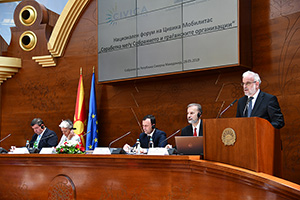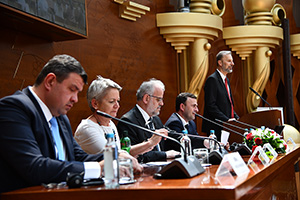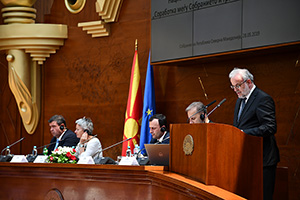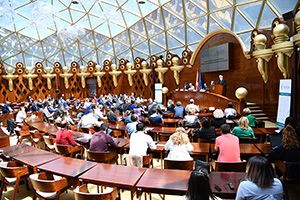 Tuesday, May 28, 2019
Tuesday, May 28, 2019
Address of the President Xhaferi at the National Forum of Civica Mobilitas on Cooperation between the Assembly and Civil Society Organizations
Dear colleagues,
Your Excellencies,
Distinguished representatives of the non-governmental sector,
Ladies and gentlemen,
At the very beginning, I wish to express my satisfaction at participating in this event. Preparing for today's conference, I recalled one of my earlier addresses on a similar topic two years ago. Let me quote only a small part: "When we mention parliamentary democracy, we mean the work and functioning of the Parliament. However, I also believe that we will all agree that parliamentary democracy is an inseparable process and must be ubiquitous, both in all three branches of government and in the society as a whole. That is, we cannot talk about democracy in the Parliament, if we have an alienated executive power, to put it mildly. At the same time, we cannot talk about parliamentary democracy, if we do not have the rule of law, a functioning legal state and, of course, transparency and accountability. And finally, we cannot talk about parliamentary democracy, without the involvement of the non-governmental sector, the expert public and the citizen as an individual", end of quote.
 As I stated, this was said two years ago when, as a society, and as an institution, we started coming out of a serious crisis. Today, we will have to answer together on the set topic "What is the cooperation of the Parliament with the non-governmental organizations like?"
As I stated, this was said two years ago when, as a society, and as an institution, we started coming out of a serious crisis. Today, we will have to answer together on the set topic "What is the cooperation of the Parliament with the non-governmental organizations like?"
Let us not forget that civil society, through NGOs, on the one hand mobilizes a much wider group of citizens who want to participate in the creation and conduct of public policies in which their interests are incorporated. Furthermore, NGOs themselves are very mobile and do not have the traditional party organization that suffocates initiatives in underdeveloped democratic societies, or even more so, the creativity of the members, at the expense of the alienated political elites.
Dear friends,
For these two years, without false modesty, I would like to emphasize that we have made not only quantitative, but even more importantly, a qualitative progress in terms of what we mean by the phrase "Open Parliament and cooperation with the non-governmental sector". The fact that more than 6 thousand citizens came and toured the Assembly last year, speaks of a solid quantitative progress. Furthermore, more one-day and two-day seminars have been organized with high school students and undergraduates, whereat the young people were being introduced to, I would say the alphabet of parliamentary democracy and the functioning of the parliament.
 I will mention the project "I have my own opinion", and further on, the regional conference dedicated to the migrant crisis, attended by representatives of the non-governmental sector from the whole region. All this says that, as a Parliament we are on the right path, that is, we are implementing the process of strengthening and upgrading parliamentary democracy through greater openness, transparency and involvement of the non-governmental organizations, the expert and professional public, as well as the citizen as an individual.
I will mention the project "I have my own opinion", and further on, the regional conference dedicated to the migrant crisis, attended by representatives of the non-governmental sector from the whole region. All this says that, as a Parliament we are on the right path, that is, we are implementing the process of strengthening and upgrading parliamentary democracy through greater openness, transparency and involvement of the non-governmental organizations, the expert and professional public, as well as the citizen as an individual.
I would also mention the oversight debates, which are one of the pillars of contemporary parliamentary democracy. NGOs are increasingly present there, and they know very precisely and at the same time critically, not only to perceive the problems and shortcomings, but also to offer appropriate creative solutions.
Further on, I would like to remind you of the recent election of members of the so-called Anti-Corruption Commission, which, as you know, is quite active and present now. In its election, the NGO sector was fully involved and I think that, for the first time in our country, the NGO sector, if I can say so, has raised the whole process above the folklore, inter-party bargaining level.
Ladies and gentlemen,
Today's event, at the same time, is a good opportunity to once again express our gratitude to our international friends, who materially, but above all, with their experts, helped us achieve these results. Here, I have to point out the Swiss Embassy and of course Her Excellency Ambassador Sibyl Suter Tejada, the Westminster Foundation for Democracy, NDI and others.
 Of course, these positive trends do not mean that we have now achieved the goal and that we should stop here. By the way, parliamentary democracy should be constantly developed and upgraded. On the contrary, these positive trends should motivate all of us, both the Parliament and the executive power, and of course the non-governmental organizations and citizens, to even more actively engage in the achievement of our strategic goals, in meeting the interests and needs of the citizens. The Assembly, in its current mandate, showed that it is open to any initiative that comes from the civil sector. We may need a more efficient channeling of those proposals and initiatives, as well as their implementation. I believe that today's event will give not only critical remarks on where we mistake, but also specific proposals on how to bring the Parliament even closer to the citizens, to their initiatives, issues and problems. It is with these thoughts in my conclusion, that I want to wish everyone a successful and fruitful job!
Of course, these positive trends do not mean that we have now achieved the goal and that we should stop here. By the way, parliamentary democracy should be constantly developed and upgraded. On the contrary, these positive trends should motivate all of us, both the Parliament and the executive power, and of course the non-governmental organizations and citizens, to even more actively engage in the achievement of our strategic goals, in meeting the interests and needs of the citizens. The Assembly, in its current mandate, showed that it is open to any initiative that comes from the civil sector. We may need a more efficient channeling of those proposals and initiatives, as well as their implementation. I believe that today's event will give not only critical remarks on where we mistake, but also specific proposals on how to bring the Parliament even closer to the citizens, to their initiatives, issues and problems. It is with these thoughts in my conclusion, that I want to wish everyone a successful and fruitful job!
Thank you for your attention!